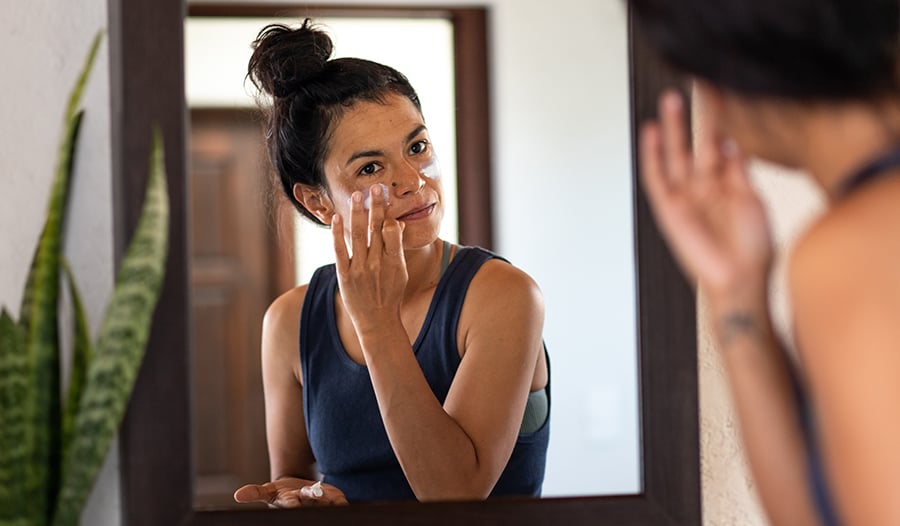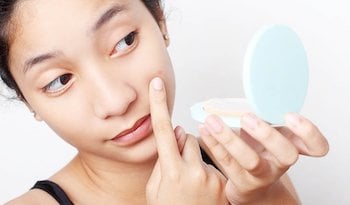Top 6 Common Causes of Skin Damage
FERAGAT:Bu blog tanı koymayı hedeflememektedir...
- Bu makalede:
- Top Two Causes of Skin Damage
- Other Causes of Skin Damage and How to Avoid Them
- How to Boost Collagen
- Takeaway

Everyone can have a more beautiful appearance and better health if they take the time to respect their skin.
Your skin is the largest organ in your body. It helps defend you from outside dangers such as infection, irritation, and inflammation. It helps regulate your body temperature and makes vitamin D when exposed to the sun. This powerful organ is, at the same time, very vulnerable to damage from mistreatment.
Time, neglect, and certain conditions can damage your skin’s integrity and make it look dull, wrinkled, spotty, and downright unhealthy.
This article will discuss the most common causes of skin damage and how to avoid them.
Top Two Causes of Skin Damage
Let’s get the two most skin-damaging habits dusted right away: Smoking and unprotected exposure to sunlight.
Smoking
Smoking ages the skin dramatically. According to tobaccofrelife.org, it's estimated that smoking 30 cigarettes a day could make your skin age an extra 14 years by the time you hit 70. It damages your skin by reducing healthy blood flow and causing an increased collagen breakdown, the skin's main structural protein. This reduces the skin’s elasticity and makes it more likely to sag and wrinkle.
Sun Exposure
Sun exposure can also cause damage—immediately by burning the skin, and over the long term, ultraviolet light causes changes to your DNA at the skin’s deepest level, the dermis. This is called photodamage, and it can lead to the breakdown of collagen, rough skin texture, skin sagging, wrinkles, age spots and freckles, broken capillaries around the nose, and general blotchiness and skin cancer. I favor micronized zinc sunscreens with an SPF of at least 35.
Other Causes of Skin Damage and How to Avoid Them
Stress, your sleeping position, eating excess added sugar, and a poor cleansing/hydrating routine can all trigger rough, dry, wrinkly skin.
Stress
Stress may increase body-wide inflammation that can worsen skin conditions and stimulate oil production, aggravating acne. A combination of daily physical activity and meditation can help you manage stress.
Sleeping Habits
Sleeping on one side of your face, night after night, year after year, can impose wrinkles, so can repetitively squint or frowning. Try sleeping on your back, wearing sunglasses to reduce squinting, have your eyes checked if you have trouble focusing. As for frowns, enjoy meditation, daily physical activity, spending time with friends, and focusing on reasons to smile!
Sugar
Excess sugar is a real beauty-buster. It can contribute to inflammation and glycation, which damages collagen, so it is no longer supple. Opt to get your sweet treats from fresh fruits and a wonderful sugar called allulose, which is available in granulated form and found naturally in figs, raisins, wheat, and molasses. It won’t make blood sugar spike.
Skincare
Using harsh cleansers and forgetting to moisturize daily can promote dryness and rough texture Use gentle make-up removers and cleansers such as aloe vera-based products. For moisturizing, the zillions of face creams available are all trying to increase and hold in moisture—and some add retinols to reduce wrinkles. Find a moisturizer that works for you and use it daily.
How to Boost Collagen
If you need to help protect your skin, you may rebuild your skin’s collagen by upgrading your nutrition—and you might consider collagen supplements.
- Harvard’s T. H. Chan School of Public Health says that high-protein foods such as fish, poultry, eggs, dairy, legumes, and soy contain amino acids that help build collagen.
- Zinc is also essential for the production of collagen in the body. You can get it from eating shellfish, legumes, nuts, and whole grains.
- Vitamin C is another important building block of collagen—and you can increase your intake of citrus fruits, strawberries, and broccoli. Vitamin C supplements can help restore healthy levels in the body if a blood test shows you are deficient.
- Collagen supplements are another option. A 2021 metastudy in the International Journal of Dermatology reviewed 19 studies and found that taking hydrolyzed collagen for 90 days helped to reduce wrinkles and improve skin elasticity and hydration.
Takeaway
Beauty is not a superficial concept, especially regarding the appearance of your skin. How your skin looks is an external barometer of your health, inside and out. It provides clues about who is likely to make a good partner, who can have
healthy children, and who might pass on an illness through direct contact or their genes. Favoring beauty is hardwired into us through evolution. No wonder attractiveness is correlated to success—financially and socially—and to your overall well-being.
Fortunately, skin’s powerful influence over your appearance and good health is within your control. Everyone can have a more beautiful appearance
and better health if they take the time to respect their skin. (That applies to you guys, too!)
So, start today to take smart steps to improve your skin’s appearance and your appealing glow of health.
References:
- https://www.niams.nih.gov/health-topics/kids/healthy-skin
- https://newsinhealth.nih.gov/2015/11/keep-your-skin-healthy
- https://www.aad.org/public/diseases/a-z/skin-overall-health
- https://tobaccofreelife.org/resources/smoking-effect
- https://www.yalemedicine.org/conditions/sun-damage.
- https://my.clevelandclinic.org/health/diseases/21858-sunburn
- https://www.iherb.com/blog/collagen-peptides-beauty/1608
- https://www.medicalnewstoday.com/articles/317151#9-ways-to-boost-collagen
- https://www.hsph.harvard.edu/nutritionsource/collagen/.
- https://pubmed.ncbi.nlm.nih.gov/33742704/
- https://www.skinassociatesfl.com/top-ten-causes-of-wrinkles-and-skin-damage/
- https://pubmed.ncbi.nlm.nih.gov/20620757/

 Kaynak: Dr. Mehmet Öz, Tıp Doktoru.
Kaynak: Dr. Mehmet Öz, Tıp Doktoru. 


